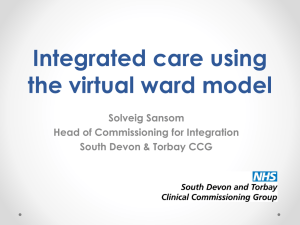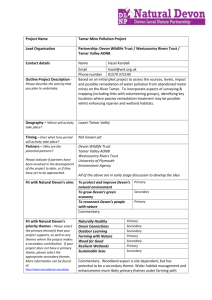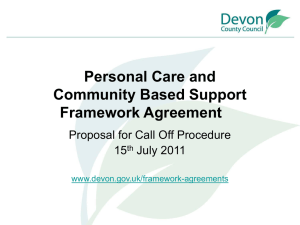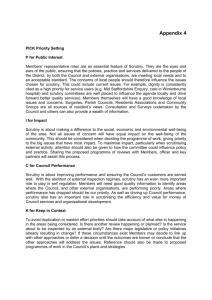Devon Scrutiny News October 2011
advertisement
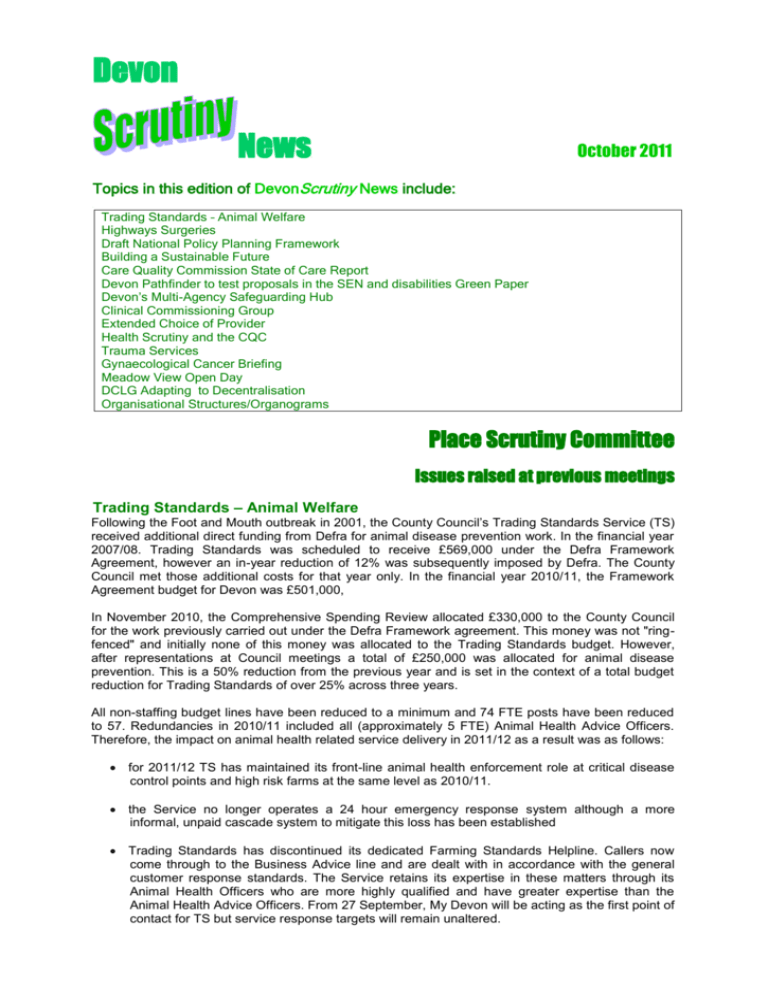
Devon News October 2011 Topics in this edition of DevonScrutiny News include: Trading Standards – Animal Welfare Highways Surgeries Draft National Policy Planning Framework Building a Sustainable Future Care Quality Commission State of Care Report Devon Pathfinder to test proposals in the SEN and disabilities Green Paper Devon’s Multi-Agency Safeguarding Hub Clinical Commissioning Group Extended Choice of Provider Health Scrutiny and the CQC Trauma Services Gynaecological Cancer Briefing Meadow View Open Day DCLG Adapting to Decentralisation Organisational Structures/Organograms Place Scrutiny Committee Issues raised at previous meetings Trading Standards – Animal Welfare Following the Foot and Mouth outbreak in 2001, the County Council’s Trading Standards Service (TS) received additional direct funding from Defra for animal disease prevention work. In the financial year 2007/08. Trading Standards was scheduled to receive £569,000 under the Defra Framework Agreement, however an in-year reduction of 12% was subsequently imposed by Defra. The County Council met those additional costs for that year only. In the financial year 2010/11, the Framework Agreement budget for Devon was £501,000, In November 2010, the Comprehensive Spending Review allocated £330,000 to the County Council for the work previously carried out under the Defra Framework agreement. This money was not "ringfenced" and initially none of this money was allocated to the Trading Standards budget. However, after representations at Council meetings a total of £250,000 was allocated for animal disease prevention. This is a 50% reduction from the previous year and is set in the context of a total budget reduction for Trading Standards of over 25% across three years. All non-staffing budget lines have been reduced to a minimum and 74 FTE posts have been reduced to 57. Redundancies in 2010/11 included all (approximately 5 FTE) Animal Health Advice Officers. Therefore, the impact on animal health related service delivery in 2011/12 as a result was as follows: for 2011/12 TS has maintained its front-line animal health enforcement role at critical disease control points and high risk farms at the same level as 2010/11. the Service no longer operates a 24 hour emergency response system although a more informal, unpaid cascade system to mitigate this loss has been established Trading Standards has discontinued its dedicated Farming Standards Helpline. Callers now come through to the Business Advice line and are dealt with in accordance with the general customer response standards. The Service retains its expertise in these matters through its Animal Health Officers who are more highly qualified and have greater expertise than the Animal Health Advice Officers. From 27 September, My Devon will be acting as the first point of contact for TS but service response targets will remain unaltered. the Service no longer provides advice on animal disease related matters, Defra operate a Farmers Helpline for disease control matters, have the necessary veterinary expertise and are well placed to provide this advice. Trading Standards self-help material has been improved but callers are now referred to the Defra helpline which reduces duplication across agencies. the Service no longer provides input into animal health movement data because - from October 2011, the recording of pig movements has been transferred from local authorities to the pig industry. There are also plans for sheep and goat movements to be recorded by the industry, although no timescales have been set and it is dependant on available finance. - the proposals for implementation of a nationwide movement standstill should an animal disease outbreak occur has arguably changed the importance of some of these records. - in the event of a disease outbreak, access could be made to on-farm records. Although a slower process, these will give a more accurate picture. - data was collected by a national system but as a result of the general economic situation other local authorities have already ceased this activity, significantly reducing the effectiveness of the system. It is anticipated that Trading Standards will lose a further 8 or 9 posts, the impact of which will be spread across the service and will impinge pro-rata on animal health enforcement duties. The overall service provided to the farmers is not at the same level as before the reductions in public sector spending and there is now no dedicated support staff to assist the front-line professionals. In the case of a disease outbreak, initial responses may not be so effective and there would be a need to call on untrained corporate administrative support. However TS has focussed efforts on a) maintaining inspection levels at critical disease control points, b) maintaining inspection levels at high risk farms and, c) dealing with significant animal health and welfare complaints and breaches of legislation. Food for thought Highway Surgeries: Involving Local Members As part of the early work of the new Neighbourhood Highway Teams, officers have been discussing with Members the potential for establishing local "drop in" highway surgeries for either the public or parish councils in Devon towns. The concept is that the local member, supported by Neighbourhood Highway Officers, will be available in a central venue at specified times to discuss highways and traffic management issues with the local community. The informal surgeries give attendees an opportunity to discuss a wide range of problems and concerns they may have by talking to their councillor and members of the Highways staff face to face together. For further information please contact Tony Matthews, Neighbourhood Highway Group Manager, telephone 01392 385088. Draft National Planning Policy Framework The Prime Minister has intervened for the first time in the growing row over planning reform to assure campaigners that the environmental benefits of developments will be assessed before new projects are given permission. The Prime Minister said that new planning laws would seek to “achieve a balance” between the environmental, social and economic dimensions of developments. He insisted that he is coKmmitted to the “magnificent countryside” and said the “beautiful British landscape is a national treasure”. The Government’s final planning guidance is currently the subject of consultation. Building a Sustainable Future: Speech by Phillip Hammond A transcript of a speech by Transport Secretary Philip Hammond at the Nikkei BP Conference in Japan on 26 September 2011 can be found here. He talks about the government's commitment to sustainability on a domestic and international level, which focuses on environmental and economic goals and the role of transport in a sustainable future. ~~~~~~~~~~ People’s Scrutiny Committee Food for thought Care Quality Commission State of Care Report The CQC have published their third annual report into the state of health and adult social care in England. The report covers the period April 2010 until March 2011 and encompasses evidence from the CQC’s first year of regulation under the Health and Social Care Act 2008. The report is divided into four main sections: The shape of health and social care provision Access to care services Choice and control Quality and safety It also includes case studies looking at how improvements in standards have been made by services and how regulatory work has helped drive these improvements. The report is available here. Devon selected as pathfinder to test out proposals in the SEN and disabilities Green Paper The Government has announced that Devon will be among 20 pathfinders, covering 31 local authorities and their Primary Care Trust partners, which will test out the main proposals in the SEN and disabilities Green Paper. Devon’s Multi-Agency Safeguarding Hub: case-study report In 2010/11 around 620 children and young people in the county of Devon were in care and 431 had a child protection plan. In 2010, a further 4,318 were defined as children in need. The range of agencies involved in safeguarding children operate across local authority boundaries: the police and probation services' responsibilities cross both Devon and Cornwall. In this context, with families moving across LA boundaries and multiple agencies lacking a unified relationship, the Multi-Agency Safeguarding Hub (MASH) model was established. The Local Government Group, on behalf of Devon County Council, commissioned a case study of Devon’s MASH. ~~~~~~~~~~ Health & Wellbeing Scrutiny Committee Issues raised at previous meetings Clinical Commissioning Group The Health and Social Care Bill requires each CCG to have a governing body to ensure it has made appropriate arrangements and complies with its duty to act with effectiveness, efficiency and economy. It will also ensure that the CCG has appropriate arrangements in place to comply with generally accepted principles of good governance. Governing bodies also have the function of determining the remuneration, fees and allowances payable to CCG employees and others providing services to it and of determining the allowances payable under a pension scheme established by the CCG The Government's response to the NHS Future Forum's recommendations (published after the "listening exercise") explained Government's intention to amend the Bill to allow regulations to be made specifying certain core requirements for governing bodies such as that there must be at least two other clinicians on every governing body: at least one registered nurse and a doctor who is a secondary care specialist. They must have no conflict of interest in relation to the clinical commissioning group’s responsibilities, for example they must not be employed by a local provider. In addition to GPs and the two other clinicians, each governing body will include at least two lay members, one with a lead role in championing patient and public involvement, the other with a lead role in overseeing key elements of governance such as audit, remuneration and managing conflicts of interest. One of the lay members will undertake either the role of Deputy Chair or Chair of the governing body. If Deputy Chair, the lay member would take the Chair’s role for discussions and decisions involving a conflict of interest for the Chair. The Government’s response also indicated that lay members would be appointed on the basis of their professional expertise and knowledge and the additional perspectives this will bring to the governance of the commissioning group, rather than necessarily having close knowledge of the local health system. They are likely to play an important role in helping make sure that the commissioning group has effective systems in place for involving a range of healthcare professionals in decision-making. Food for thought Extended Choice of Provider – 10 minute survey Members have an opportunity to respond themselves to the national programme to extend the choice of provider for a range of community and mental health services in 2012/13. Initially there will be 3 services selected for extending provider choice and this is an opportunity to take part in a local survey and influence the provision of care in the area. The range of services being considered is shown below: Musculoskeletal services for neck/back pain Adult hearing services in the community Continence services for children and adults Wheelchair services for children Podiatry (specialist foot care) services Venous leg ulcer and wound healing Adult primary care psychological therapies Diagnostic tests closer to home If any Member is interest then please click here for the survey: https://www.surveymonkey.com/s/Q5F7YDH Responses are required before 8 October Health Scrutiny Working with the CQC The Care Quality Commission has launched two new guides to help tackle poor care. The first is a Guide for Overview and Scrutiny Committees for health and social care: How your committee can work with the Care Quality Commission (September 2011). The second is a shorter guide for local councillors: A guide for local councillors: How you can work with the Care Quality Commission (September 2011). Both of these guides have been developed with the help of the Centre for Public Scrutiny and with a number of local authority scrutiny officers and members and may act a useful tool for Members in the future. A guide for OSCs.pdf A guide for councillors.pdf Changes to Trauma Services Cllr Westlake recently attended a conference on the changes to the Trauma service and has asked that a copy of the presentation given at that event be made available to Members. Gynaecological Cancer Briefing The Peninsular Cancer Network is working to improve cancer services, this briefing paper focuses on gynaecological services. Let to Cllr Richard Gynae cancer Westlake (Exeter) 26 briefing 9 11.pdfSep11Final.pdf Invitation to Meadow View Open Day - Friday 7 October 2011 This is a newly refurbished psychiatric inpatient ward offering services for older people at North Devon District Hospital. ~~~~~~~~~~ … and of general interest DCLG: Accountability - Adapting to decentralisation This Report examines how accounting officers will drive the government's localism agenda and continue to account to Parliament for the use of public money. Organisational Structures/Organograms As promised at meetings of Scrutiny Committees in the previous cycle ... indicative structures/organograms for the functions within each service, including contact details, are attached: ... for Place .. for Corporate Services For further information please contact Camilla de Bernhardt (camilla.de.bernhardt@devon.gov.uk) for the Health & Wellbeing and Corporate Services Scrutiny Committees Janine Gassmann (janine.gassmann@devon.gov.uk) for the Place Scrutiny Committee Dan Looker (dan.looker@devon.gov.uk) for the People’s Scrutiny Committee The Joint Scrutiny Work Programme is available on the Council’s website and Agenda, Reports and Minutes of Scrutiny Committees may also be viewed on the website. Prepared by the Democratic Services & Scrutiny Secretariat, County Hall, Exeter [3.10.11]


